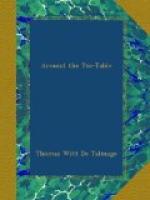CHAPTER XXXV.
An editor’s chip-basket.
On our way out the newspaper rooms we stumbled over the basket in which is deposited the literary material we cannot use. The basket upset and surprised us with its contents. On the top were some things that looked like fifteen or twenty poems. People outside have no idea of the amount of rhyme that comes to a printing office. The fact is that at some period in every one’s life he writes “poetry.” His existence depends upon it. We wrote ten or fifteen verses ourselves once. Had we not written them just then and there, we might not be here. They were in long metre, and “Old Hundred” would have fitted them grandly.
Many people are seized with the poetic spasm when they are sick, and their lines are apt to begin with.
“O mortality! how frail art thou!”
Others on Sabbath afternoons write Sabbath-school hymns, adding to the batch of infinite nonsense that the children are compelled to swallow. For others a beautiful curl is a corkscrew pulling out canto after canto. Nine-tenths of the rhyme that comes to a printing office cannot be used. You hear a rough tear of paper, and you look around to see the managing editor adding to the responsibilities of his chip-basket. What a way that is to treat incipient Tennysons and Longfellows!
Next to the poetic effusions tumble out treatises on “constitutional law” heavy enough to break the basket. We have noticed that after a man has got so dull he can get no one willing to hear him he takes to profound exposition. Out from the same chip-basket rolls a great pile of announcements that people want put among the editorials, so as to save the expense of the advertising column. They tell us the article they wish recommended will have a highly beneficial effect upon the Church and world. It is a religious churn, or a moral horse-rake, or a consecrated fly trap. They almost get us crying over their new kind of grindstone, and we put the letter down on the table while we get out our pocket-handkerchief, when our assistant takes hold the document and gives it a ruthless rip, and pitches it into the chip-basket.
Next in the pile of torn and upset things is the speech of some one on the momentous occasion of the presentation of a gold-headed cane, or silver pitcher, or brass kettle for making preserves. It was “unexpected,” a “surprise” and “undeserved,” and would “long be cherished.” “Great applause, and not a dry eye in the house,” etc., etc. But there is not much room in a paper for speeches. In this country everybody speaks.
An American is in his normal condition when he is making a speech. He is born with “fellow-citizens” in his mouth, and closes his earthly life by saying, “One word more, and I have done.” Speeches being so common, newspaper readers do not want a large supply, and so many of these utterances, intended to be immortal, drop into oblivion through that inexhaustible reservoir, the editorial chip-basket.




